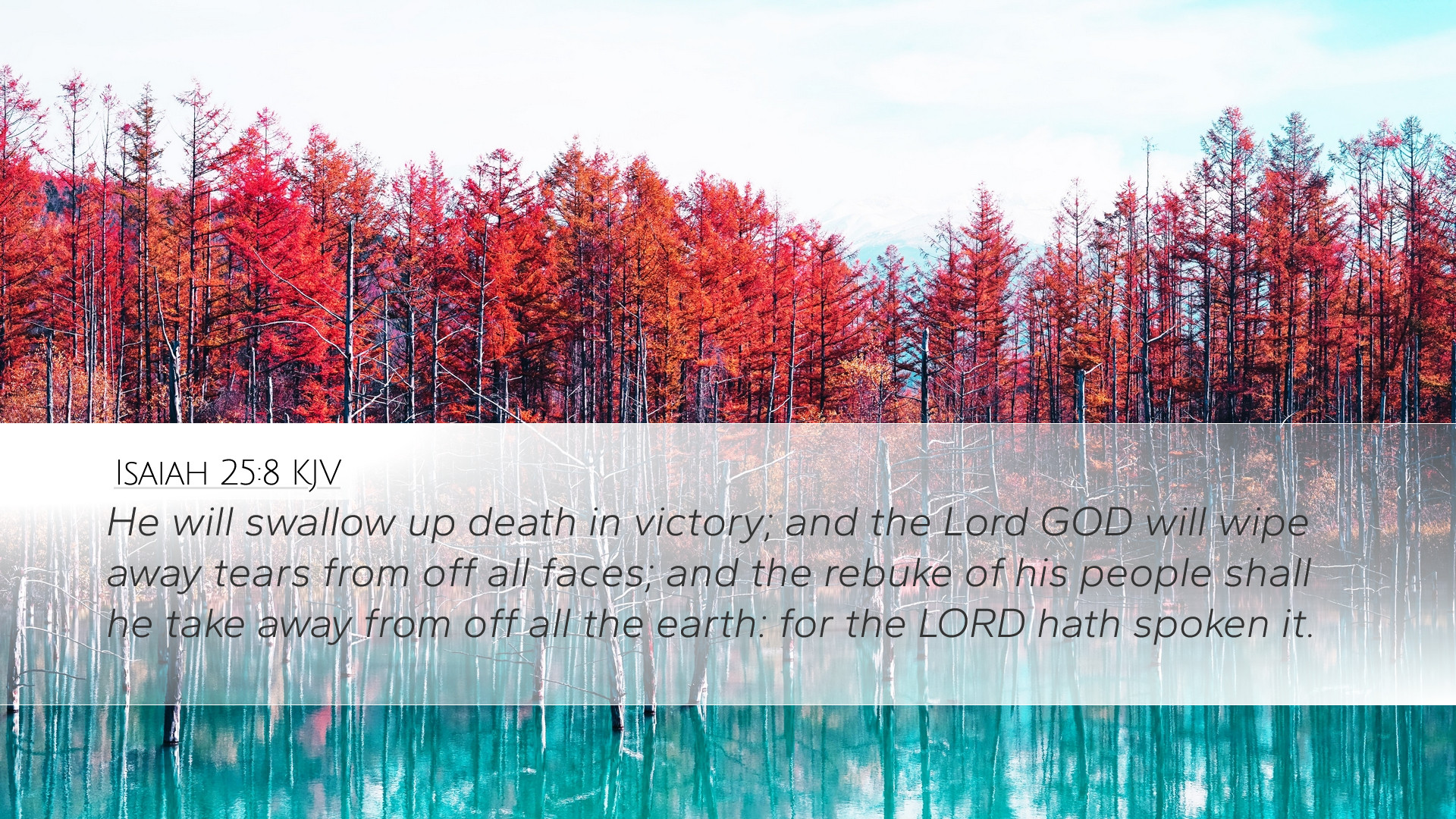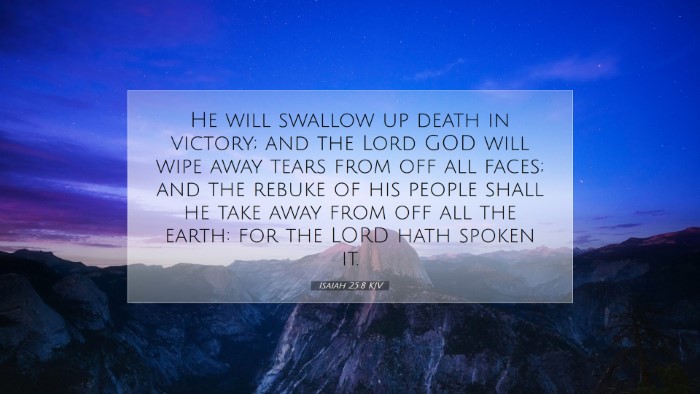Commentary on Isaiah 25:8
Isaiah 25:8 (KJV): "He will swallow up death in victory; and the Lord God will wipe away tears from off all faces; and the rebuke of his people shall he take away from off all the earth: for the Lord hath spoken it."
Introduction
This verse stands as a significant promise of hope and future restoration, where death, the ultimate human adversary, is defeated. In this commentary, we draw insights from several public domain theologians, delineating the theological, eschatological, and pastoral implications of Isaiah 25:8.
Theological Reflections
Isaiah 25:8 encapsulates the profound promise of God’s victory over death. The verse not only speaks to the immediate context of Israel’s trials but casts a vision toward a future where God’s justice and mercy prevail.
- Defeat of Death: Matthew Henry notes that the phrase "swallow up death in victory" signifies a complete and utter vanquishing of death. This imagery of swallowing depicts God overpowering death, pulling it into Himself, rendering it powerless. Such language portrays death not just as a temporary obstacle but as a defeated foe.
- The Comforting God: Albert Barnes emphasizes the reassurance that God will wipe away tears from all faces. This act symbolizes divine comfort and the removal of grief, suggesting that God is profoundly attentive to human suffering.
- The Reversal of Shame: Both Henry and Clarke discuss the lifting of the “rebuke” from off His people, pointing to a time when Israel's disgrace and suffering will come to an end. Clarke remarks that this prophetic vision highlights the divine promise of restoration, indicating that God’s people will no longer bear the pain of rejection or scorn.
Eschatological Implications
Isaiah’s prophecy points toward eschatological realities that fulfill the hope of ultimate redemption. This reflects a broader biblical narrative where death and suffering yield to the triumph of God's kingdom.
- Promise of Resurrection: Matthew Henry asserts that this verse hints at the resurrection hope found in Christ, which is ultimately realized in the New Testament. The Apostle Paul echoes this in 1 Corinthians 15:54, where he states that death is swallowed up in victory through Christ.
- Hope Beyond Suffering: Clarke asserts that the promise of wiping away tears indicates a future state wherein God eradicates sorrow. This is particularly poignant for those facing persecution or grief, as it affirms that their current suffering will be resolved in the final consummation.
- God’s Sovereignty: Barnes comments on the finality of God’s declaration — “for the Lord hath spoken it.” This indicates the certainty of the events prophesied, affirming God's ultimate control over time and history.
Pastoral Application
The themes articulated in Isaiah 25:8 offer rich material for pastoral care and teaching. Pastors and theologians can derive important applications for ministry that resonate deeply with human experiences.
- Offering Hope: This verse provides a foundation for hope amidst despair. Pastors can harness its truths to minister effectively to individuals facing grief, by reminding them of the hope found in Christ’s victory over death.
- Comfort in Trials: The imagery of God wiping away tears serves as a powerful reminder of God’s compassionate character. It encourages believers to turn to God in times of distress, knowing He is intimately aware of their pain and capable of providing comfort.
- Encouragement for the Church: The corporate dimension of this prophecy invites the church to act as a beacon of hope. The church is called to reflect God's redemptive work by advocating for the marginalized and suffering, embodying the love and compassion represented in these verses.
Conclusion
Ultimately, Isaiah 25:8 serves as a profound declaration of God’s sovereign victory over death and suffering. The insights gleaned from significant commentaries highlight the theological depth, eschatological implications, and pastoral applications inherent in this verse. As believers reflect on this promise, they are drawn toward a deeper understanding of God’s faithfulness and the hope of ultimate restoration that awaits them.


